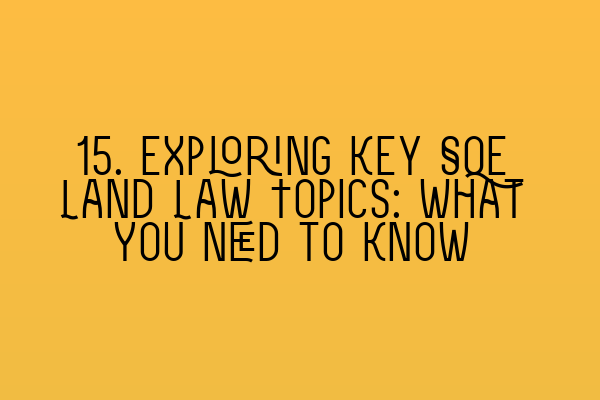15. Exploring Key SQE Land Law Topics: What You Need to Know
Welcome to SQE Property Law & Land Law, the premier solicitor firm specializing in property law and land law. As experts in the field, we understand the importance of staying up to date with the latest developments and knowledge in order to provide the best legal advice and services to our clients. In this blog post, we will explore 15 key topics in SQE Land Law that every solicitor should be familiar with. So let’s dive in!
1. Freehold and Leasehold
Understanding the distinction between freehold and leasehold ownership is crucial in land law. Freehold refers to absolute ownership of the land and all buildings on it, while leasehold grants a person the right to use and occupy the land for a specific period of time. Knowing how to advise clients on their rights and obligations in these different types of ownership is essential for solicitors.
2. Easements and Covenants
Easements and covenants are important legal concepts that affect land ownership. An easement grants a person the right to use another person’s land for a specific purpose, such as a right of way. Covenants, on the other hand, are promises made by the owner of the land that restrict or regulate the use of the land. Understanding the nature and implications of these legal mechanisms is essential for land law solicitors.
3. Adverse Possession
Adverse possession is a concept in land law where someone who is not the legal owner of the land can acquire ownership rights over it if they have possessed the land for a certain period of time. This can be a complex area of law, and solicitors need to be well-versed in the requirements and limitations of adverse possession claims.
4. Land Registration
Land registration is the process of recording the ownership and interests in land. It offers legal protection to owners and provides certainty in land transactions. Solicitors need to understand how the land registration system works, including the registration of transfers, charges, and other interests in land.
5. Landlord and Tenant Law
Landlord and tenant law governs the relationship between landlords and tenants, including rights and obligations, rent, repairs, and eviction. Solicitors need to be familiar with the relevant legislation, such as the Landlord and Tenant Act 1954, in order to advise clients effectively in the context of commercial and residential leases.
6. Conveyancing Process
The conveyancing process is the legal process of transferring ownership of land from one party to another. Solicitors play a crucial role in ensuring that all necessary legal steps are taken, including conducting searches, drafting contracts, and registering the transfer. Having a solid understanding of the conveyancing process is vital for solicitors practicing in property law.
7. Co-ownership and Trusts of Land
Co-ownership and trusts of land involve situations where two or more people own land together. Understanding the different forms of co-ownership, such as joint tenancy and tenancy in common, as well as the principles of trust law, is essential for solicitors advising clients on shared ownership or disputes involving co-owned land.
8. Mortgages and Charges
Mortgages and charges are ways of securing a loan against a property. Solicitors need to have a thorough understanding of the legal framework surrounding mortgages, including the creation, enforcement, and discharge of mortgages, as well as dealing with situations where borrowers default on their mortgage repayments.
9. Planning and Development
Planning and development law regulates how land is used and developed. Solicitors need to be familiar with planning legislation, including local planning policies, permissions, and appeal processes, in order to assist clients with obtaining planning permission, appealing decisions, and navigating the complexities of development projects.
10. Boundaries and Encroachments
Boundaries and encroachments are common disputes that arise in land law. Solicitors must be able to advise clients on how to resolve boundary disputes, determine the legal position of boundaries, and handle situations where a neighboring property encroaches on their client’s land.
11. Restrictive Covenants
Restrictive covenants are clauses in deeds that restrict the use or development of land. They can have a significant impact on the value and potential use of a property. Solicitors need to understand how to interpret, enforce, modify, or discharge restrictive covenants in order to protect their clients’ interests.
12. Rights of Way
Rights of way grant a person the right to pass and repass over someone else’s land. Solicitors need to understand the different types of rights of way, including express, implied, and prescriptive rights, and be able to advise clients on asserting or defending these rights.
13. Nuisance and Trespass
Nuisance and trespass are common causes of action in land law. Solicitors need to be familiar with the legal principles governing these issues and be able to advise clients on how to prevent or address nuisances or trespasses, as well as pursuing or defending legal claims related to these matters.
14. Leasehold Enfranchisement
Leasehold enfranchisement is the process by which leaseholders can acquire the freehold or extend their leases. Solicitors need to understand the Leasehold Reform Act 1967 and other relevant legislation in order to assist leaseholder clients with enfranchisement claims.
15. Dispute Resolution
Disputes can arise in various aspects of land law, including boundary disputes, rent arrears, breach of contract, and professional negligence. Solicitors need to be skilled in alternative dispute resolution methods, such as negotiation and mediation, as well as litigation, in order to effectively resolve land law disputes for their clients.
At SQE Property Law & Land Law, we are passionate about providing the best legal services in property law and land law. Our team of expert solicitors is well-versed in all aspects of SQE Land Law, ensuring that our clients receive top-notch advice and representation. If you require assistance with any land law matters, please contact us for a consultation.
Related Articles:
